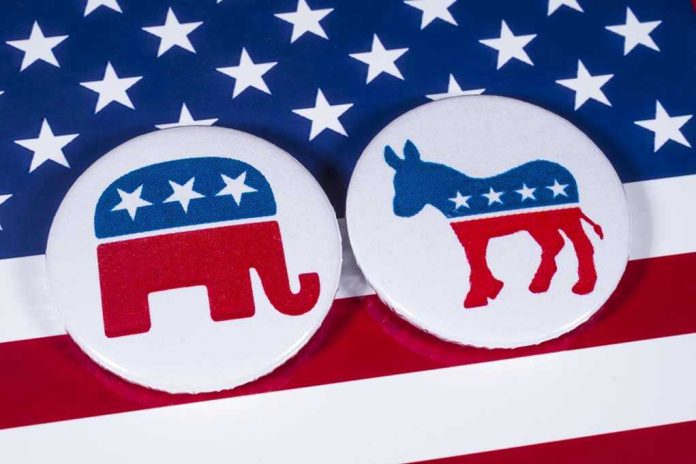
When Monopoly cards become weapons in a high-stakes election, it’s no longer just a game—it’s a signal that the Virginia Attorney General race is rewriting the playbook for political ridicule and accountability.
Story Snapshot
- Republicans distributed satirical ‘Get Out of Jail Free’ cards lampooning Jay Jones’ legal and ethical controversies.
- The creative tactic targeted Jones’ reckless driving conviction, violent texts, and fundraising claims.
- Ongoing investigations and prosecutor recusals keep voters guessing about the real story behind the scandals.
- Virginia’s AG race exposes how spectacle and scandal now drive campaign strategy and voter perception.
Monopoly Cards Become Political Ammunition in Virginia
Republicans in Virginia swapped yard signs for Monopoly-style ‘Get Out of Jail Free’ cards, handing them out at campaign stops from Roanoke to Richmond. The cards, emblazoned with tongue-in-cheek slogans, referenced Jay Jones’ reckless driving conviction, disputed community service hours, and violent text messages. This wasn’t casual satire—it was a calculated move by the Republican Attorneys General Association (RAGA) to spotlight what they call Jones’ “Pinocchio politics” and alleged double standards in law enforcement.
As billboards rolled through Democratic strongholds and campaign volunteers distributed cards at heated town halls, the visual metaphor was impossible to ignore. Voters could literally hold Jones’ scandals in their hands. The tactic resonated with conservatives who saw it as a clever jab, but it also forced independent and Democratic voters to confront uncomfortable questions about accountability and transparency in the race for the state’s top legal office.
Scandal Timeline: Driving, Texts, and the Money Trail
Jay Jones’ troubles started well before the Monopoly cards. In 2022, he was convicted of reckless driving after being clocked at 116 mph; community service replaced jail time, sparking questions about privileged treatment. By October 2025, Jones was embroiled in new controversy when texts surfaced in which he appeared to fantasize about violence toward political opponents. Both parties condemned the rhetoric, but the story didn’t end there.
Jones’ campaign claimed a $500,000 fundraising surge post-debate. Republicans quickly pounced, releasing a press statement debunking those figures and tracing the bulk of donations to out-of-state sources and the Democratic Attorneys General Association (DAGA). Public records and independent reporting from VPAP backed up the Republican charge, adding fuel to the narrative that Jones was playing fast and loose with campaign finance transparency.
Investigations and Recusals: Who’s Watching the Watchers?
While Jones attempted damage control, apologizing for his texts and promoting his fundraising prowess, local prosecutors faced mounting pressure. Multiple officials recused themselves from investigating Jones’ community service records and reckless driving case, citing potential conflicts of interest. The result: stalled investigations and a campaign trail clouded by unanswered legal questions.
These recusals sparked debate over impartiality and accountability. Conservative commentators argued that Jones benefited from political favoritism, while Democrats pointed to the timing of Republican attacks as evidence of a coordinated smear campaign. The ongoing probes, coupled with the spectacle of the Monopoly cards, created an open loop for voters—would any of the investigations reach a conclusion before Election Day, or would the cloud of suspicion linger?
Satire, Spectacle, and Voter Cynicism
Political analysts say the Monopoly card stunt is more than just a gimmick—it’s a sign of how American campaigns now weaponize satire. The cards personalized Jones’ scandals, turning abstract allegations into tangible, memorable props. For voters over forty, many of whom grew up playing Monopoly, the reference was instantly recognizable and loaded with meaning: do the powerful really get a free pass?
Legal experts warn that prosecutor recusals and stalled investigations risk undermining faith in the justice system. Meanwhile, the race’s relentless focus on scandal and spectacle raises concerns about the substance of campaign debate. If policy positions are drowned out by creative ridicule and negative advertising, what message does that send about the future of American democracy?
Sources:
RAGA press release: Jay Jones campaign finance fantasy debunked by RAGA
Fox News Digital: GOP blasts Jay Jones over disputed $500k claim, points to record of deception
AOL News: Democrats poured more than $1M into Jay Jones campaign
WWMT: Analyst questions Election Day fallout from Jay Jones’ texts



